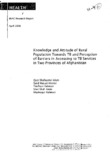| dc.contributor.author | Islam, Qazi Shafayetul | |
| dc.contributor.author | Ahmed, Syed Masud | |
| dc.contributor.author | Rahman, Taufiqur | |
| dc.contributor.author | Amin, Sher Shah | |
| dc.contributor.author | Rahman, Mashuqur | |
| dc.date.accessioned | 2019-11-28T04:44:25Z | |
| dc.date.available | 2019-11-28T04:44:25Z | |
| dc.date.issued | 2008-04 | |
| dc.identifier.citation | Islam, Q. S., Ahmed, S. M., Rahman, T., Amin, S. S., & Rahman, M. (2008, April). Knowledge and attitude of rural population towards TB and perception of barriers in accessing to TB services in two provinces of Afghanistan. Research Reports (2008): Health Studies, Vol - XL, 71–99. | en_US |
| dc.identifier.uri | http://hdl.handle.net/10361/13145 | |
| dc.description.abstract | The study aimed to explore i) the awareness and knowledge on tuberculosis (TB), ii)
knowledge on TB diagnosis and treatment, iii) attitudes towards TB, and iv) perception of
barriers in accessing to TB services. The approach adopted for this study was cross-sectional,
multi-stage 30-cluster sampling method, face to face interview with adult male and female
(aged + 15 year) in Badghis and Balkh provinces of Afghanistan. The total sample size was
900. The general awareness about ·rs was high in both the provinces (around 96%). TB was
perceived widely as dangerous (81 %), and incurable (85%) by the population in both the
provinces. A misperception that 'TB is a disease of female' was also observed in these
provinces (78%) . Though the knowledge on symptom suggestive of TB (chronic cough) was
high (9 I%), they lacked knowledge on other associated symptoms of TB. Knowledge on
microbiological cause of TB was totally absent. However, they had different cultural
explanations for the causation of TB. The knowledge on transmission and prevention was not
comprehensive and varied by province and gender. Knowledge on diagnostic test was high
(S5%), but when to test sputum was poor (26%). Knowledge on place of diagnosis was lacking.
Respondents had also poor knowledge on management of TB (e.g., treatment duration, place of
treatment). Tendency to seek care from government facilities lnr TB treatment was low ( 18%)
in Afghanistan despite TB services offered free at government health facilities. Population had
less access to community health workers (CHW) and public facilities for obtaining TB
information. TB patients in both the provinces prioritized work over taking TB treatment.
Besides, financial problem, shame and fear of isolation were found to be important deterrents
in accessing to TB care. Health education content and materials should be reviewed and
redesigned appropriately tnr disseminating comprehensive information on TB causation,
transmission, prevention, diagnostic place and misperception associated with TB as well. A
social support network (SSN) should be established within the community to support the TB
patients to overcome the barriers. | en_US |
| dc.language.iso | en | en_US |
| dc.publisher | BRAC Research and Evaluation Division (RED) | en_US |
| dc.subject | Knowledge | en_US |
| dc.subject | Rural population | en_US |
| dc.subject | TB | en_US |
| dc.subject | Afghanistan | en_US |
| dc.subject | Provinces | en_US |
| dc.subject.lcsh | Tuberculosis | |
| dc.subject.lcsh | Rural health--Afghanistan | |
| dc.subject.lcsh | Community health services--Afghanistan | |
| dc.subject.lcsh | Health, Nutrition, and Population Program (BRAC) | |
| dc.title | Knowledge and attitude of rural population towards TB and perception of barriers in accessing to TB services in two provinces of Afghanistan | en_US |
| dc.type | Research report | en_US |

